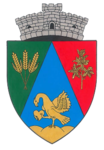Tiream
Tiream
Mezőterem | |
|---|---|
 Location in Satu Mare County | |
| Coordinates: 47°37′N 22°28′E / 47.617°N 22.467°E | |
| Country | Romania |
| County | Satu Mare |
| Government | |
| • Mayor (2024–2028) | Nicolae Tar (PCM) |
| Area | 53.25 km2 (20.56 sq mi) |
| Elevation | 125 m (410 ft) |
| Population (2021-12-01)[1] | 2,068 |
| • Density | 39/km2 (100/sq mi) |
| Time zone | EET/EEST (UTC+2/+3) |
| Postal code | 447325 |
| Area code | (+40) 02 61 |
| Vehicle reg. | SM |
| Website | tiream |
Tiream (Hungarian: Mezőterem, Hungarian pronunciation: [ˈmɛzøːtɛrɛm]; German: Wiesenfeld, from 2002 on Terem) is a commune of 2,068 inhabitants situated in Satu Mare County, Romania. It is composed of three villages: Portița (Portelek), Tiream, and Vezendiu (Vezend).
The commune is located in the southwestern part of the county, on the banks of the river Sânmiclăuș.
Administration
[edit]The current local council has the following political composition, based on the results of the votes cast at the 2024 Romanian local elections.
| Party | Seats | Current Council | ||||||
|---|---|---|---|---|---|---|---|---|
| Democratic Alliance of Hungarians in Romania (UDMR/RMDSZ) | 6 | |||||||
| Social Democratic Party (PSD) | 2 | |||||||
| National Liberal Party (PNL) | 1 | |||||||
| Alliance for the Union of Romanians (AUR) | 1 | |||||||
| Democratic Forum of Germans in Romania (FDGR/DFDR) | 1 | |||||||
Demographics
[edit]| Year | Pop. | ±% |
|---|---|---|
| 1850 | 2,905 | — |
| 1890 | 3,202 | +10.2% |
| 1900 | 3,488 | +8.9% |
| 1910 | 3,813 | +9.3% |
| 1920 | 3,636 | −4.6% |
| 1930 | 3,661 | +0.7% |
| 1941 | 3,768 | +2.9% |
| 1966 | 3,641 | −3.4% |
| 1977 | 3,114 | −14.5% |
| 1992 | 2,489 | −20.1% |
| 2002 | 2,358 | −5.3% |
| 2011 | 2,226 | −5.6% |
| 2021 | 2,068 | −7.1% |
| Source:Census Database[2] | ||
At the 2002 census, Tiream had 2,358 inhabitants; of those, 48.3% were Romanians, 29.2% were Hungarians, 14.1% Germans (mainly Satu Mare Swabians), and 8.1% Roma.[3] According to mother tongue, 50.1% of the population spoke Romanian, while 45.6% spoke Hungarian as their first language.
At the 2011 census, the commune had a population of 2,226, of which 41.06% were Romanians, 23.67% were Hungarians, 20.13% Roma, and 10.92% Germans. At the 2021 census, the population had decreased to 2,068, of which 41.05% were Romanians, 40.18% were Hungarians, 7.06% Roma, and 4.11% Germans.[4]
References
[edit]- ^ "Populaţia rezidentă după grupa de vârstă, pe județe și municipii, orașe, comune, la 1 decembrie 2021" (XLS). National Institute of Statistics.
- ^ Census Database
- ^ Romanian census data, 2002; retrieved on March 22, 2010
- ^ "Populația rezidentă după grupa de vârstă, pe județe și municipii, orașe, comune, la 1 decembrie 2021" (in Romanian). INSSE. 31 May 2023.


